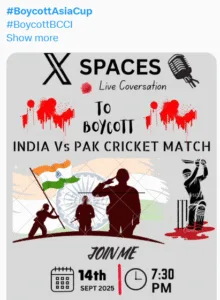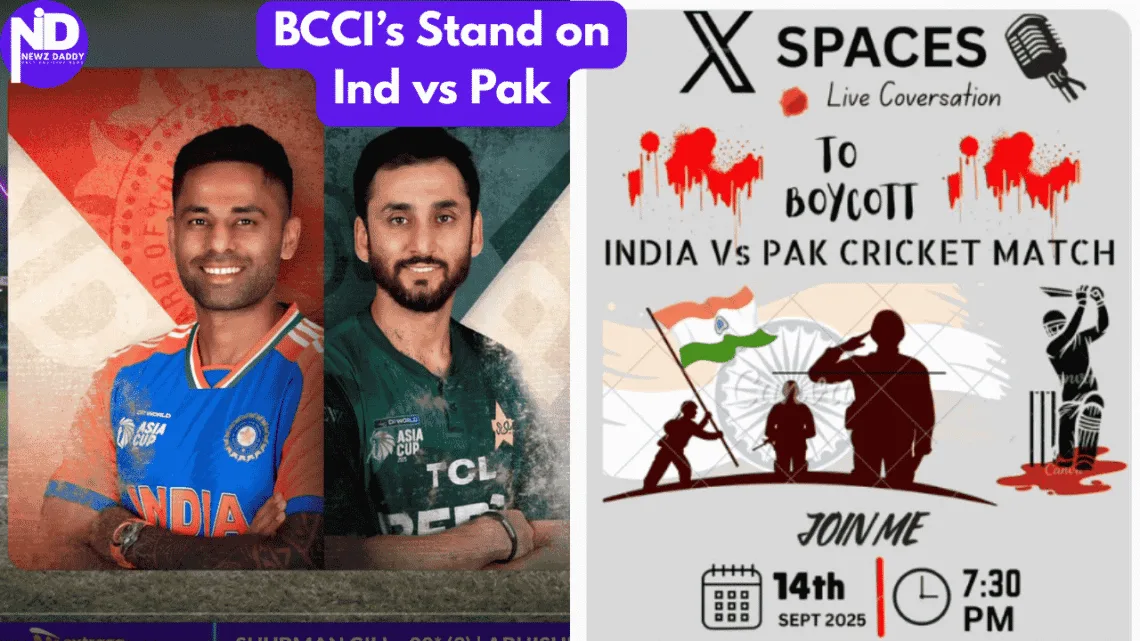“BCCI’s Stand On India vs Pakistan Asia Cup
Newz Daddy Asia Cup 2025 Updates
“Boycott Calls Grow, But Inside Camp, The India vs Pakistan Asia Cup Focus Stays On Cricket.”
Team India’s assistant coach Sitanshu Kotak has made it clear that the focus inside the dressing room is only on cricket, not on the noise outside. Speaking in Dubai ahead of Sunday’s high-voltage Asia Cup clash against Pakistan, Kotak said the players are preparing to play their best cricket. “Once we are here to play, we are focused on playing cricket. I personally don’t think there is anything on my mind apart from playing cricket,” he told reporters. He added that the team takes direction from the BCCI, which in turn follows the Indian government’s policy. “Once the BCCI says and they are aligned with the government, we are here to prepare and play. India versus Pakistan is always competitive, so we would rather focus on that,” Kotak explained.

The timing of this match has made it more than just about cricket. Just a few months ago, a terror attack in Pahalgam killed 26 tourists. India responded with Operation Sindoor, targeting terrorist camps in Pakistan and Pakistan-occupied Kashmir. Many people believed that after such an attack, India would not face Pakistan even in international tournaments. Those hopes were shaken when the Asia Cup schedule confirmed that India and Pakistan would meet in the group stage, and possibly again in the Super 4 and the final if both sides progress.
This has led to strong calls for boycotting the match. Social media in India is full of posts criticising the BCCI for agreeing to play. Several popular handles have openly declared they will not watch the game. Some fans even moved the courts, filing petitions to cancel the match, but those were dismissed. Emotions are running high, as many feel playing Pakistan so soon after the Pahalgam attack sends the wrong message. For them, the cricket field is not separate from the national mood.
The BCCI, however, has a clear explanation. India does not play bilateral cricket with Pakistan—no one-on-one series, even on neutral grounds. That policy stands firm. But in multilateral events like the Asia Cup or the World Cup, India is allowed to play Pakistan. The BCCI says it has no choice but to follow the government’s directions. Former cricketers like Kapil Dev have also urged fans to keep calm, reminding them that players have a duty to play while governments make the policies.
While the political debate rages, another story is unfolding off the field. Ticket sales for the much-anticipated India versus Pakistan game have been far from encouraging. Normally, this is the hottest ticket in cricket, with seats selling out within hours. This time, many seats remain unsold just days before the game. Several reasons explain this. For one, ticket prices have been set unusually high. Reports say premium tickets cost over ₹2.5 lakh for just two seats, putting them out of reach for most fans. Even standard tickets were priced steeply before organizers were forced to cut rates after backlash.
Another factor is the absence of big names. Virat Kohli and Rohit Sharma are not part of India’s T20 squad for this tournament, and their absence has taken some shine away from the contest. For many casual fans, these superstars are the reason to watch. Add to this the frustration of fans being asked to buy ticket packages covering multiple games instead of just the India-Pakistan clash, and the lukewarm response becomes easier to understand.
Still, the cricket itself remains the center of attention for players and coaches. India and Pakistan matches have always carried intense rivalry, from the packed stands to the millions of TV viewers across the globe. Even though this time ticket sales are slow and calls for boycotts are loud, broadcasters are expecting huge viewership. Whether TV ratings will touch record highs or dip due to the current public mood remains to be seen.
Sunday’s clash will also test how well players can shut out the noise. With emotions running high back home, the Indian team is under pressure not just to win but to carry the weight of national expectations. For Pakistan, too, this is more than just a game, as every meeting with India is seen as a battle of pride. Both sides know that the contest could happen more than once in this Asia Cup, making it all the more crucial to set the tone in the first meeting.
In the end, while politics and emotions swirl outside the ground, the players will walk out at the Dubai International Stadium with one simple goal: to win a game of cricket. For fans, the bigger question is whether they will choose to watch and cheer, or turn away in protest. The stadium seats and television ratings will tell that story soon enough.






